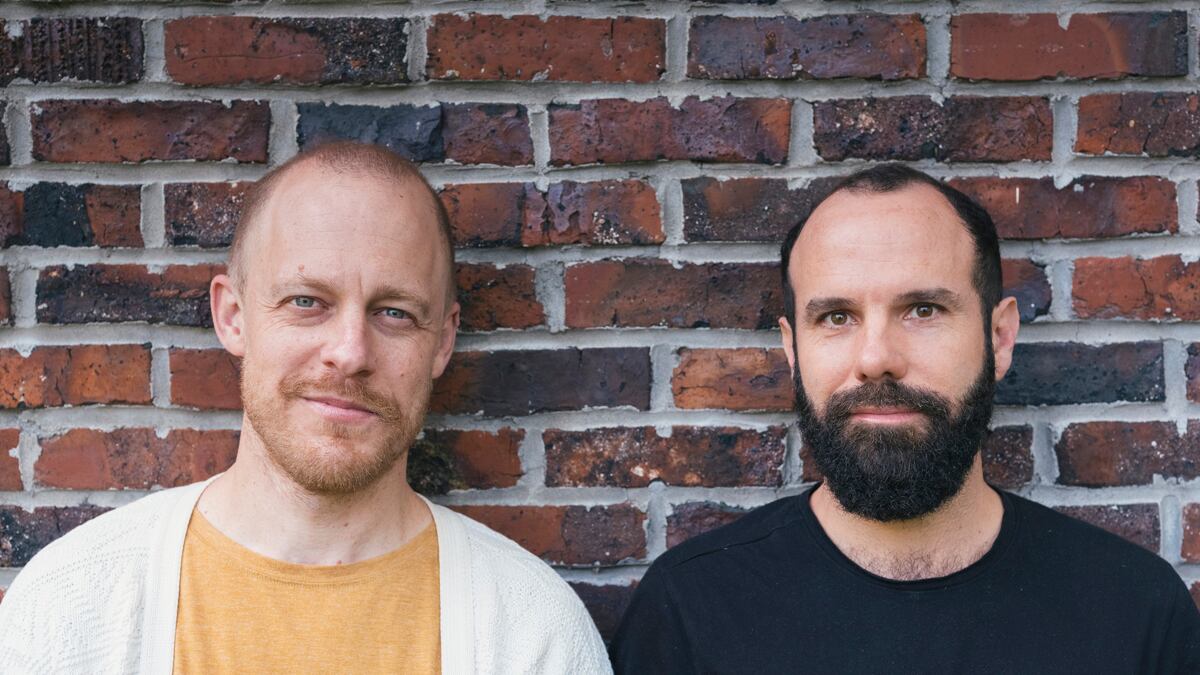3. Methods Body
SOUNDS LIKE: An alien language you need to practice a lot to learn how to speak.
When John Niekrasz met Luke Wyland in 2007, a mutual friend introduced him: "Dark twin, meet your light twin."
They've been best friends ever since.
"There are a few people in my life I feel this immediate, deep, almost psychic bond with," says Wyland. "This is something that goes beyond words."
The two Portlanders, who perform together as Methods Body, have personalities that seem to fit neatly into the dark-versus-light trope: Niekrasz is dark-bearded and loquacious, while Wyland is blond and soft-spoken. But as Methods Body, their music is one roiling, shifting mass. On their self-titled debut album, which came out last May, Niekrasz's drums take up nearly as much space in the mix as Wyland's keyboards. Amid the dense wall of sound they create, it's hard to tell how many musicians are playing or even what instruments are being used.
"Depending on the day, your mood, you can get different things from it," says Wyland. "It's our relationship in real time, with the audience and the music as the mediator."
Save for an occasional snippet of spoken word, there are no vocals in their music. But words are a shared obsession for both musicians. Niekrasz uses a self-devised system of "syllabic notation" to translate the cadences of speech into complex drum patterns. And multi-instrumentalist Wyland composes with microtonal scales that more closely approximate the wonky, broken, bent notes that come out of our mouths as we speak.
"The speech part of my brain doesn't always work when it comes down into the actual mechanism," says Wyland, who was born with a stutter, as he draws an imaginary line from his cranium to his mouth. "And now that I accept that and love that and actually see what it's given me, I'm grateful."
The two musicians have so much in common that they indeed seem to have a sort of mind meld going at times. But they're also strong-willed personalities with different pedigrees and comfort zones. Niekrasz generally considers himself a "performer and improviser" more than a studio musician. Wyland, who's recorded four albums with local experimental band AU, is more at home in the studio.
"To come together with like two strong leadership voices, we both had to compromise in new ways we weren't comfortable with," says Niekrasz. "I learned a ton about recording. Luke has all these skills I don't have that I'm really grateful for. It took a long time, but it felt right."
Much of the recording took place on a friend's property on a hill overlooking the Sandy River about 25 miles east of Portland.
"It put us more in tune with the natural rhythms of nature," says Wyland. "John and I, our frequencies are very high, and the energy out [there] is the opposite. We fed off that."
Methods Body comprises two compositions, split into nine tracks for convenience on digital platforms. The first, "Quiet," is all burly drums and droning synths. The second, "Claimed Events," is made of skittering rimshots and simmering electronics.
The contrast between these two tracks reflects a duality inherent in the band's writing and recording process: the meticulous studio band that spent untold hours recording two pieces, and the caged lion that is Methods Body live. The group had planned tours all over the globe, including with tape-loop maestro William Basinski and Brooklyn art-rock veterans Oneida. These were, needless to say, canceled.
"I'm feeling a little existential about what we should be doing right now," says Wyland.
One answer has been to release music for charity. Methods Body considers their work "music that wants change," and that's as true of its constantly shifting structure as its optimism: If Wyland can turn his stutter into confident, heavy rock, why shouldn't anyone with a voice be able to speak up?
As such, they're appearing on a compilation co-released by their labels, Portland's Beacon Sound and New York's New Amsterdam, benefiting nonprofits the Okra Project and Vocal-NY. They've also released a remix of "Quiet Pt. 3" by Deerhoof's John Dieterich to benefit the Black Resilience Fund.
But Niekrasz and Wyland agree that until shows happen, a significant side of their work will be unknown to the public.
"We're performers, that's actually our medium," says Niekrasz. "That idea of community coming together is so important."
Still, as hard as it is to hear "Quiet" and not imagine how strong it would come on in a club, it's just as hard to hear this shifting, roiling, moving, methodical, corporeal music and argue their hard work in the studio didn't pay off.
Besides, says Niekrasz: "Just being able to produce good work with someone and be growing is a gift for me."
Best New Bands 2020
1. Maita | 2. Raquel Divar | 3. Methods Body | 4. Soft Kill | 5. Bryson Cone | 6. Sea Moss | 7. Marcus McCauley | 8/9/10. Spoon Benders | 8/9/10. Mope Grooves | 8/9/10. Mo Troper
Four Portland Music Community Leaders Speak on the Scene's Role During the Protests
